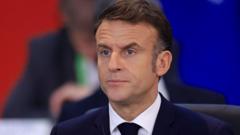France's President Emmanuel Macron has announced the formation of a panel comprised of historians from both France and Haiti to investigate the historical ties and financial burdens attributed to Haiti’s independence, hoping to foster a more equitable future.
Macron Establishes Commission to Examine French-Haitian History and Independence Debt

Macron Establishes Commission to Examine French-Haitian History and Independence Debt
A new commission aims to explore the impact of Haiti's colonial history and the independence debt imposed by France.
In a significant move to address historical grievances, French President Emmanuel Macron has declared the establishment of a commission dedicated to examining the intricate history between France and Haiti, specifically focusing on the heavy financial burden imposed on the Caribbean nation as it achieved independence. The commission, consisting of French and Haitian historians, is tasked with analyzing the implications of the staggering debt that Haiti was obliged to repay to France following its independence in 1804.
Haiti’s struggle for autonomy was overshadowed by an 1825 decree from France, demanding payment of 150 million gold francs—later lowered to 90 million—to compensate former French slave holders. This crippling debt was not fully settled until 1947, severely affecting Haiti’s economic stability and contributing to its status as one of the most impoverished nations in the Americas. Over the years, such financial grievances have fueled tensions between the two nations, with many Haitians demanding reparations from France.
Though the French government has acknowledged the historical injustices of slavery, discussions of returning the so-called "independence debt" have been largely sidestepped. Macron acknowledged the issue, stating the debt "put a price on the freedom of a young nation," symbolizing the enduring legacy of colonialism.
Haitian writer Monique Clesca emphasized the importance of France confronting these historical injustices as part of re-establishing a sense of influence among its former colonies. She suggested that acknowledging the debt could offer a form of solace, even if it doesn’t erase past harms.
Currently, Haiti faces severe challenges including economic turmoil, political instability, and escalating gang violence, with over 5,500 lives lost to gang-related incidents in 2024 alone, causing more than a million people to flee their homes. Meanwhile, plans for organizing long-overdue elections remain stagnant under Haiti's transitional presidential council, which was formed to restore democratic governance. As the new commission embarks on its vital work, the outcomes could potentially reshape French-Haitian relations and illuminate pathways towards a more peaceful coexistence.




















